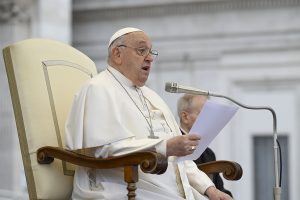VATICAN CITY (CNS) – There are no second-class Christians, Pope Francis said. The laity, including women, and the clergy all have special gifts to edify the church in unity and holiness.
“The laity are not in last place. No. The laity are not a kind of external collaborator or the clergy’s ‘auxiliary troops.’ No! They have their own charisms and gifts with which to contribute to the mission of the church,” the pope said Nov. 20 at his general audience in St. Peter’s Square.
Continuing a series of talks on the role of the Holy Spirit in the life of the church, Pope Francis looked at how the Holy Spirit builds up the Body of Christ through the outpouring of charismatic gifts.

The Holy Spirit “distributes special graces among the faithful of every rank. By these gifts, He makes them fit and ready to undertake the various tasks and offices which contribute toward the renewal and building up of the church,” he said, quoting from the Second Vatican Council’s Dogmatic Constitution on the Church, “Lumen Gentium.”
A charism is “the gift given for the common good, to be useful for everyone. It is not, in other words, destined principally and ordinarily for the sanctification of the person. No. It is intended, however, for the service of the community,” Pope Francis said.
“Secondly, the charism is the gift given to one or to some in particular, not to everyone in the same way, and this is what distinguishes it from sanctifying grace, from the theological virtues and from the sacraments, which instead are the same and common to all,” he said.
The definition of a charism is also part of what Pope Benedict XVI described in “the process of true renewal, which often took unexpected forms in living movements and made almost tangible the inexhaustible vitality of the holy church,” he added, quoting the late pope.
“We have to rediscover the charisms because this ensures that the promotion of the laity, and of women in particular, is understood not only as an institutional and sociological fact, but also in its biblical and spiritual dimension,” the pope said.
Charisms, he said, are sometimes misunderstood as being “spectacular or extraordinary gifts and capabilities.”
“Instead, they are ordinary gifts. Each one of us has his or her own charism that assumes extraordinary value if inspired by the Holy Spirit and embodied with love in situations of life,” he said.
“Such an interpretation of the charism is important, because many Christians, when they hear talk of charisms, experience sadness and disappointment, as they are convinced that they do not possess any, and feel they are excluded or second-class Christians,” he said.
“There are no second-class Christians. No. Each person has his or her own personal charism” that are gifts at the service of charity, in that they belong to all and are for the good of all, he said.
